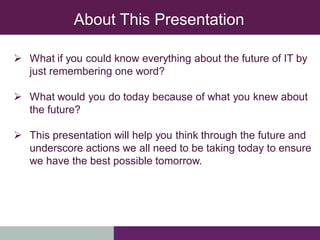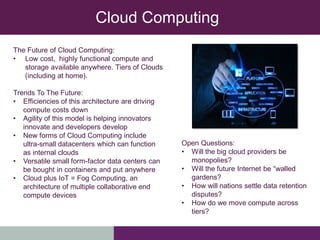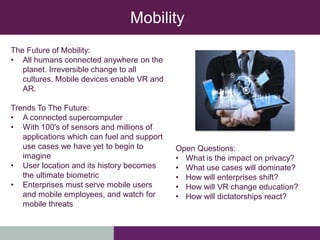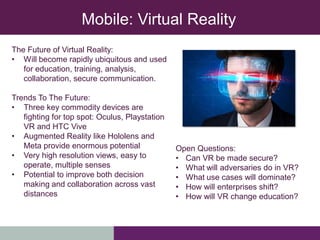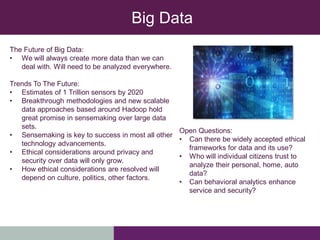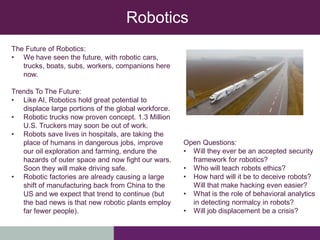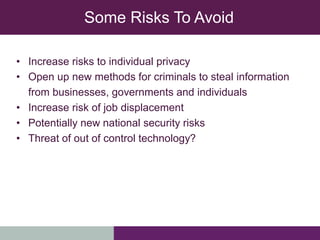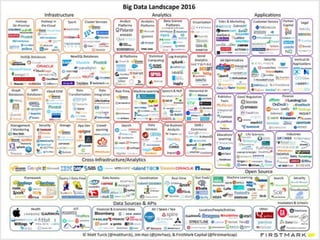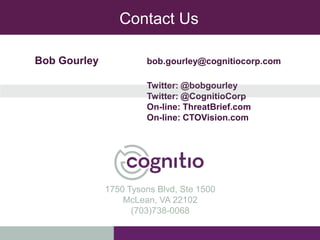Bob Gourley
- 1. The Seven Megatrends of Cambric How we think. Bob Gourley, Partner, Cognitio May 18, 2016 Bob.gourley@cognitiocorp.com
- 2. About This Presentation What if you could know everything about the future of IT by just remembering one word? What would you do today because of what you knew about the future? This presentation will help you think through the future and underscore actions we all need to be taking today to ensure we have the best possible tomorrow.
- 3. Background Do you remember this scene from The Graduate?: Mr. McGuire: I just want to say one word to you. Just one word. Benjamin: Yes, sir. Mr. McGuire: Are you listening? Benjamin: Yes, I am. Mr. McGuire: Plastics. Turns out Plastics was pretty hot. Great tip there Mr. McGuire. What is the word for today? Our research all points to one word. The word is Cambric.
- 4. CAMBRIC CAMBRIC stands for: Cloud Computing Artificial Intelligence Mobility Big Data Robotics Internet of Things CyberSecurity
- 5. Cloud Computing The Future of Cloud Computing: • Low cost, highly functional compute and storage available anywhere. Tiers of Clouds (including at home). Trends To The Future: • Efficiencies of this architecture are driving compute costs down • Agility of this model is helping innovators innovate and developers develop • New forms of Cloud Computing include ultra-small datacenters which can function as internal clouds • Versatile small form-factor data centers can be bought in containers and put anywhere • Cloud plus IoT = Fog Computing, an architecture of multiple collaborative end compute devices Open Questions: • Will the big cloud providers be monopolies? • Will the future Internet be “walled gardens? • How will nations settle data retention disputes? • How do we move compute across tiers?
- 6. Artificial Intelligence The Future of Artificial Intelligence: • Computer software assists people in every function and totally displaces many human jobs, across all industries and disciplines. Trends To The Future: • With business models returning profit now, all indications are AI is here to stay • AI and Machine Learning and Cognitive Computing are being coupled with incredibly low cost cloud computing • No accepted protocol for security in AI. • Creators use a “generate and test” approach to creating functionality. • AI seems easier to deceive than current computer software. Open Questions: • Will job displacement be a crisis? • Will companies use AI for good? • Will there ever be a widely-accepted security framework for AI? • Can behavioral analytics enhance security? • What lessons are in Microsoft Tay’s conversion to evil?
- 7. Mobility The Future of Mobility: • All humans connected anywhere on the planet. Irreversible change to all cultures. Mobile devices enable VR and AR. Trends To The Future: • A connected supercomputer • With 100's of sensors and millions of applications which can fuel and support use cases we have yet to begin to imagine • User location and its history becomes the ultimate biometric • Enterprises must serve mobile users and mobile employees, and watch for mobile threats Open Questions: • What is the impact on privacy? • What use cases will dominate? • How will enterprises shift? • How will VR change education? • How will dictatorships react?
- 8. Mobile: Virtual Reality The Future of Virtual Reality: • Will become rapidly ubiquitous and used for education, training, analysis, collaboration, secure communication. Trends To The Future: • Three key commodity devices are fighting for top spot: Oculus, Playstation VR and HTC Vive • Augmented Reality like Hololens and Meta provide enormous potential • Very high resolution views, easy to operate, multiple senses • Potential to improve both decision making and collaboration across vast distances Open Questions: • Can VR be made secure? • What will adversaries do in VR? • What use cases will dominate? • How will enterprises shift? • How will VR change education?
- 9. Big Data The Future of Big Data: • We will always create more data than we can deal with. Will need to be analyzed everywhere. Trends To The Future: • Estimates of 1 Trillion sensors by 2020 • Breakthrough methodologies and new scalable data approaches based around Hadoop hold great promise in sensemaking over large data sets. • Sensemaking is key to success in most all other technology advancements. • Ethical considerations around privacy and security over data will only grow. • How ethical considerations are resolved will depend on culture, politics, other factors. Open Questions: • Can there be widely accepted ethical frameworks for data and its use? • Who will individual citizens trust to analyze their personal, home, auto data? • Can behavioral analytics enhance service and security?
- 10. Robotics The Future of Robotics: • We have seen the future, with robotic cars, trucks, boats, subs, workers, companions here now. Trends To The Future: • Like AI, Robotics hold great potential to displace large portions of the global workforce. • Robotic trucks now proven concept. 1.3 Million U.S. Truckers may soon be out of work. • Robots save lives in hospitals, are taking the place of humans in dangerous jobs, improve our oil exploration and farming, endure the hazards of outer space and now fight our wars. Soon they will make driving safe. • Robotic factories are already causing a large shift of manufacturing back from China to the US and we expect that trend to continue (but the bad news is that new robotic plants employ far fewer people). Open Questions: • Will they ever be an accepted security framework for robotics? • Who will teach robots ethics? • How hard will it be to deceive robots? Will that make hacking even easier? • What is the role of behavioral analytics in detecting normalcy in robots? • Will job displacement be a crisis?
- 11. Internet of Things The Future of the Internet of Things: • The benefits of having everything connected and generating and processing data will touch every aspect of our work and lives. But it will also bring criminals into contact with everything dear to us. Trends To The Future: • Largely enabled by embedded computing devices and ubiquitous communications • IoT reaches to vehicles, robots, homes, towns and cities, commerce, manufacturing and every aspect of industry. • Use cases are expected to include enhancements to education, training, safety, security, healthcare, transportation and optimized manufacturing. Open Questions: • Do you believe this will be any more secure than our current systems? • How can we optimize distributed processors when they are idle? • What transmission protocols will rule? • What will normal be? What is role of behavioral analytics?
- 12. CyberSecurity The Future of Cybersecurity: • Today no organization can defend itself alone. This will remain true in the future. Trends To The Future: • Some of humanity's greatest thinkers, business leaders and computer scientists have struggled to enhance cyber security. Their approaches are not working. • Cybersecurity will have to advance or none of these other technologies will be optimized. • Cybersecurity is especially important because of the newfound complexity arising in our systems. • Behavioral analytics is seen as a promising approach to enhancing our response • All source intelligence analysis is critical Open Questions: • Is humanity sleepwalking into a preventable catastrophe? • Will it be easier to trick future systems? • Will any organization be able to defend itself without help? • What is the role of behavioral analytics?
- 13. The Impact of These Trends We use acronym CAMBRIC as a mnemonic to help make these seven technology disciplines easier to think through together. When you think of one of them think of them all, and consider the potential impacts of these technologies when used together. Cloud Computing | Artificial Intelligence | Mobility | Big Data | Robotics | Internet of Things | CyberSecurity
- 14. Some Benefits To Look Forward To • Better enabling mass collaboration on problems to generate solutions • Interfaces like VR plus mobility and cloud can make the highest quality education a right accessible by all • Enhancing the ability to leverage data to solve issues of poverty, healthcare, the economy and issues of war and peace • Enable new business models across every industry • Improve safety in our everyday lives and in the workforce • Enable knowledge capture, which will enhance the continued advancement of humanity • Enhance the ability of law enforcement to fight violent crime • Improve healthcare and extend meaningful life
- 15. Some Risks To Avoid • Increase risks to individual privacy • Open up new methods for criminals to steal information from businesses, governments and individuals • Increase risk of job displacement • Potentially new national security risks • Threat of out of control technology?
- 16. Recommendations Organizational leaders should consider the impact of these on operations. Odds are very high that old processes will fail under the pressure of change. Anticipate how you will adjust. Work in your organization to collectively address questions like: • How might these technologies impact your business or organizational mission? • How can you build an agile data management framework that enables you to make use of all data at your disposal, including new formats and sources you have never anticipated? • How can you mitigate risks to your mission in a world where there will never be perfect security? • Can you leverage new all source intelligence and behavioral analytics approaches to enhance security? • Consider ethics and how you approach all these technologies in the most ethical ways
- 17. Recommendations (Cont) And finally, the impossible recommendation: Track Every Capability From Every Firm on the Following Three Graphics
- 20. Digital Guardian
- 21. Cognitio’s Role • Cognitio tracks over 800 venture capital funded technology firms with capabilities to make significant contributions to your mission • Our leadership includes seasoned intelligence community technologists already under contract to you • Engage us in market research to find the right technology to meet your needs • Reach any firm for a proof of concept via our fast turn contracts • Inform your decisions with studies and assessments on any technology discipline Contact: bob.gourley@cognitiocorp.com
- 22. Concluding Recommendations Stay Informed and Engaged, Share What You Know And Think. And Keep In Touch! TheCyberThreat.com CTOvision.comThreatBrief.com
- 23. Contact Us 1750 Tysons Blvd, Ste 1500 McLean, VA 22102 (703)738-0068 Bob Gourley bob.gourley@cognitiocorp.com Twitter: @bobgourley Twitter: @CognitioCorp On-line: ThreatBrief.com On-line: CTOVision.com
- 24. About Cognitio Cognitio is a strategic consulting and engineering firm led by a team of former senior technology executives from the U.S. Intelligence Community. We have a track record of safeguarding some of the nation’s greatest secrets, equipping U.S. leadership with actionable intelligence that helps protect lives and driving technology innovation that kept key government agencies generations ahead. Cognitio leverages that vast knowledge to enable companies across disparate industries to effectively manage technology, maximize technology investments, and reduce overall institutional risk. We Do Three Things Cyber Security Innovation Data Analytics We provide cyber assessment, awareness, remediation and containment strategies. Our process, the Cyber360 includes best practices from government and industry. Continued innovation is required for market success. Innovation requires well thought out action plans informed by knowledge of both legacy and new technologies. We know the “so-what” of data, it is there to enhance your ability to achieve your business objectives. And we know the infrastructure and applications required to let you take advantage of your data.
- 25. How we think.


